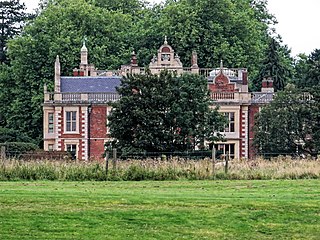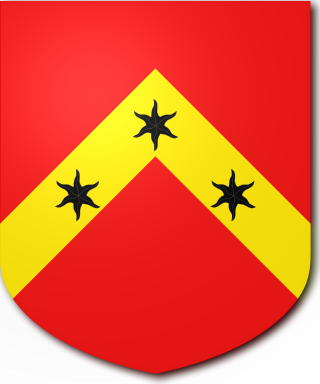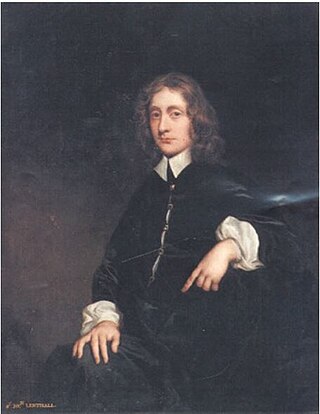Related Research Articles
Sir John Ernle was an English politician who sat in the House of Commons at various times between 1654 and 1695. He was one of the longest-serving Chancellors of the Exchequer, a position he held from 2 May 1676 to 9 April 1689.
Sir John Barrington, 3rd Baronet of Barrington Hall, Essex was an English lawyer and politician who sat in the House of Commons at various times between 1645 and 1679.

Sir Thomas Barrington, 2nd Baronet, 1585 to 18 September 1644, was an English politician and Puritan activist who sat in the House of Commons at various times between 1621 and 1644. In the early stages of the First English Civil War, he helped establish the Eastern Association, one of the most effective elements of the Parliamentarian army.

The Carr Baronetcy, of Sleaford in the County of Lincolnshire, is a title in the Baronetage of England. It was created on 29 June 1611 for Edward Carr who was Sheriff of Lincolnshire in 1614. The 3rd Baronet was Chancellor of the Duchy of Lancaster and a Member of Parliament for Lincolnshire in the House of Commons.
Clerk of the Council of the Duchy of Lancaster is an office of the Duchy of Lancaster, in England.

Sir Job Charlton, 1st Baronet KS was an English judge and politician who sat in the House of Commons between 1659 and 1679. He was Speaker of the House of Commons of England briefly in 1673.

Sir Gilbert Gerard was a prominent lawyer, politician, and landowner of the Tudor period. He was returned six times as a member of the English parliament for four different constituencies. He was Attorney-General for more than twenty years during the reign of Elizabeth I, as well as vice-chancellor of the Duchy of Lancaster, and later served as Master of the Rolls. He acquired large estates, mainly in Lancashire and Staffordshire.
Sir Gilbert Gerard, 1st Baronet of Harrow on the Hill was an English politician who sat in the House of Commons at various times between 1614 and 1660. He was a supporter of the Parliamentary cause during the English Civil War and of Oliver Cromwell during the Protectorate.

Sir John Lenthall was an English Member of Parliament. He was elected MP for Gloucester in 1645, knighted by Oliver Cromwell in 1658 and made Governor of Windsor Castle from 1657 to 1660. After the 1660 Restoration of the Monarchy he was pricked Sheriff of Oxfordshire for 1672–73 and knighted a second time by Charles II in 1677.

Thomas Gerard, 1st Baron Gerard was a Staffordshire and Lancashire landowner and politician, a member of six English parliaments for three different constituencies. Although a prominent member of the Essex faction in the reign of Elizabeth I, he avoided involvement in the Essex Rebellion and received greater honours, including a peerage, in the reign of James I.

Sir Francis Wenman was an English politician who sat in the House of Commons between 1628 and 1640.
Sir Francis Gerard, 2nd Baronet was an English politician who sat in the House of Commons variously between 1641 and 1660.
Sir Gilbert Gerard, 1st Baronet of Fiskerton was an English soldier and politician. During the English Civil War he supported the Royalist cause. After the Restoration he sat in the House of Commons from 1661 to 1685.
Sir Henry Peckham (1614–1673) was an English landowner, lawyer, judge, administrator, and politician who sat in the House of Commons as MP for Chichester in Sussex at various times between 1654 and 1673.
Sir Thomas Thynne was an English lawyer and politician who sat in the House of Commons in 1660.

Francis Luttrell (1628–1666) of Dunster Castle, Somerset, was an English lawyer and politician who sat in the House of Commons at various times between 1656 and 1666.

Edward Tooker was an English lawyer and politician from Wiltshire, who sat in the House of Commons at various times between 1654 and 1664. From 1631 to 1639, he was the legal guardian of his nephew Sir Anthony Ashley Cooper, who later described him as "a very honest, industrious man, an hospitable, prudent person, much valued and esteemed, dead and alive, by all that knew him".

John Hales, of The Dungeon in the parish of St. Mary Bredin, Canterbury, Kent, was an administrator, politician and judge who was appointed a Baron of the Exchequer in 1522.
William Cooke, of Highnam Court, Gloucestershire, was an English politician. He was a Member (MP) of the Parliament of England for Gloucester in 1679 and 1689 to 1695.
Gilbert Gerard was an English Member of Parliament for Chester in Elizabeth I's 8th Parliament in 1593.
References
- ↑ Burke & Burke 1838, p. 217.
- 1 2 3 Helms & Cruickshanks 1983.
- ↑ Shaw 1906, p. 233.